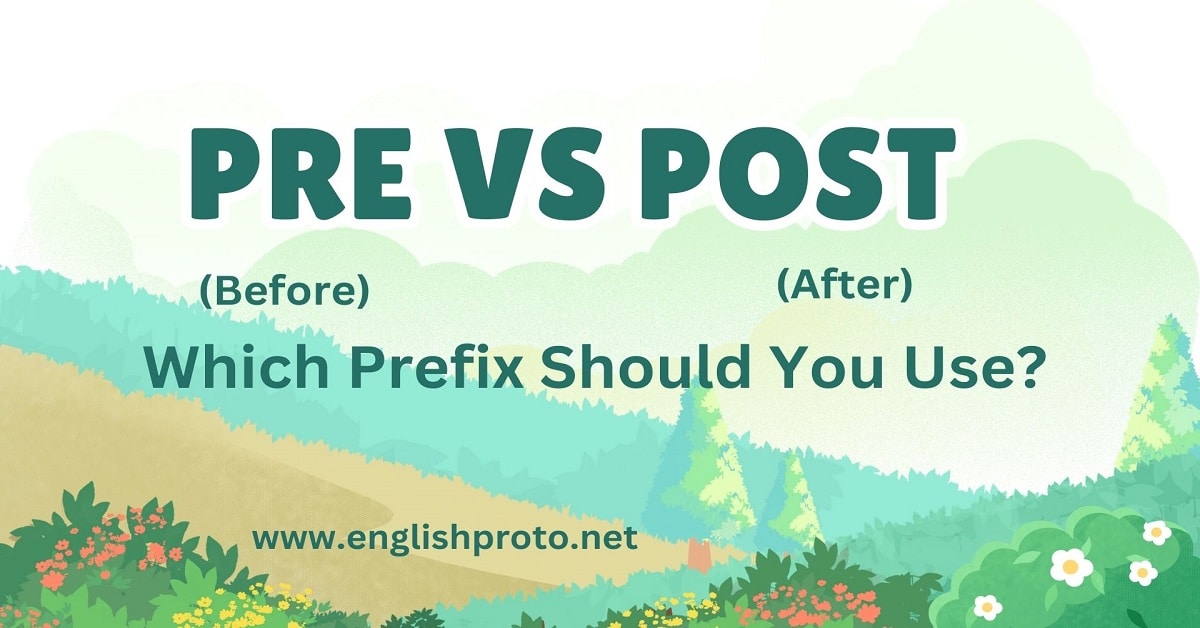Pre vs Post: Which Prefix Should You Use? You’ve probably encountered these prefixes countless times, but do you know exactly how to use them?
Whether you’re writing an email, crafting a report, or even chatting casually, choosing the right prefix can make all the difference in how your message comes across. Misusing them might lead to confusion or even unintended humor!
In this guide, we’ll break down the mystery of pre- and post- with real-world examples and easy tips to ensure you always get it right. By the end, you’ll master these prefixes like a pro and elevate your communication skills effortlessly. Let’s dive in!
Quick Summary
The prefixes pre and post denote time-related concepts:
- Pre: Refers to something occurring before a specified time or event.
- Post: Refers to something occurring after a specified time or event.
Key Takeaways:
- Use pre when discussing actions or conditions preceding an event (e.g., “preliminary meeting”).
- Use post for actions or conditions following an event (e.g., “post-game analysis”).
- Avoid combining these prefixes incorrectly with root words (e.g., “postpone” is correct, but “post-pone” is not).
Quick Tip: Always check the root word’s context to determine whether it aligns with a before or after meaning.
Pre and post meaning
Pre refers to something that happens before, while post points to something that occurs after. These prefixes help define time or order in a simple way. Understanding them can clarify events, schedules, or processes. They’re small but powerful tools in communication!
Reasons for Confusion
Many people struggle with these prefixes due to:
- Similarity in pronunciation: Both prefixes are short and sound somewhat alike, leading to occasional mix-ups.
- Inconsistent usage in compound words: Some terms, like “prepaid” or “postpartum,” are familiar, while others, like “post-study,” might feel less intuitive.
- Regional language variations: British and American English occasionally differ in prefix usage or compound word conventions.
- Overthinking timeframes: Writers might second-guess whether an event is truly “before” or “after” another event.
Detailed Explanation
Understanding “Pre”
The prefix pre originates from Latin, meaning “before.” It suggests anticipation or preparation for an event. Common scenarios include:
- Timeframe: “Prehistoric creatures” (existing before recorded history).
- Preparation: “Preheat the oven” (heat it before cooking).
- Sequence: “Prerequisite courses” (courses required before advancing).
Understanding “Post”
The prefix post, also from Latin, means “after.” It often signals reflection, consequences, or results of an event. Typical contexts include:
- Timeframe: “Post-war policies” (policies enacted after the war).
- Reflection: “Postmortem examination” (examination after death).
- Outcomes: “Postgraduate studies” (studies pursued after graduation).
Quick Tip: To decide between pre and post, visualize a timeline with the event at the center. Ask yourself whether the action happens earlier (pre) or later (post).
Compound Words with Pre and Post
Many English words incorporate these prefixes seamlessly. Here’s a handy table:
| Prefix | Examples | Explanation |
| Pre | Prepaid, Predetermined, Pretrial | Indicates actions/events occurring before |
| Post | Postscript, Postoperative, Postseason | Indicates actions/events occurring after |
Common Errors About Pre vs Post
Misplaced Hyphens
- Incorrect: “Pre-paid subscription”
- Correct: “Prepaid subscription”
Quick Tip: Most pre and post compound words don’t need a hyphen unless clarity demands it (e.g., “post-test”).
Redundant Usage
- Incorrect: “Pre-before meeting”
- Correct: “Pre-meeting”
Misinterpretation of Context
- Incorrect: “The pre-event cleanup took place after the party.”
- Correct: “The post-event cleanup took place after the party.”
Synonyms or Alternatives
While pre and post are irreplaceable in some cases, you can sometimes use alternatives:
- For Pre: Before, prior to, earlier.
- Example: “Prior to the meeting” instead of “Pre-meeting.”
- For Post: After, subsequent to, following.
- Example: “Following the event” instead of “Post-event.”
Examples in Sentences
To reinforce understanding, here are some examples:
- Pre
- The students attended a pre-orientation session to prepare for their first day.
- The recipe suggests preheating the oven to 375°F.
- Post
- The team conducted a post-game review to analyze their performance.
- She focused on recovery during the post-surgery period.
Quick Tip: When in doubt, substitute “before” or “after” to test the sentence’s accuracy.
Origins and History
Both prefixes trace back to Latin roots, reflecting their enduring relevance in English. Pre (from “prae”) and post (from “post”) were first adopted into Old and Middle English, often appearing in scholarly or formal texts. Over time, their usage expanded to everyday contexts, emphasizing their flexibility and utility.
Expanded Context: Pre and Post in Modern Usage
The prefixes pre and post are prevalent in modern language, especially in professional, medical, and educational contexts. For example:
- Medical Terminology: Terms like “prenatal care” (care before birth) and “postoperative instructions” (guidelines after surgery) highlight the importance of precision in health communication.
- Education: In academic settings, “pretests” and “posttests” help evaluate knowledge before and after learning sessions.
- Business: Concepts such as “prelaunch strategies” (plans before a product release) and “postmortem meetings” (reviews after project completion) are critical in corporate workflows.
Pre vs Post: Practical Application in Writing
When using these prefixes, consider the following steps:
- Identify the Event: Clearly determine the central event or action.
- Establish the Timeframe: Decide whether the action occurs before (pre) or after (post) the event.
- Choose the Right Compound: Refer to standard dictionaries or style guides for confirmation if unsure about compound word spelling.
Advanced Examples in Context
- Pre:
- “The company conducted a pre-employment screening to ensure the candidate’s qualifications.”
- “Historical records document prehistoric cultures that existed millennia ago.”
- Post:
- “The team organized a post-match debrief to assess their performance on the field.”
- “Her dedication to her postdoctoral research advanced the field of neuroscience.”
Conclusion
Mastering the distinction pre vs post is essential for clear and polished communication. By understanding their meanings, usage, and nuances, you can avoid common pitfalls and confidently express time-related concepts. Remember:
- Use pre for “before” and post for “after.”
- Check compound words for proper spelling and hyphenation.
- When in doubt, visualize a timeline to clarify the relationship.
Clear communication hinges on precision, and choosing the right prefix is a step toward writing that resonates. Embrace these tips, and your writing will shine with professionalism and clarity.



